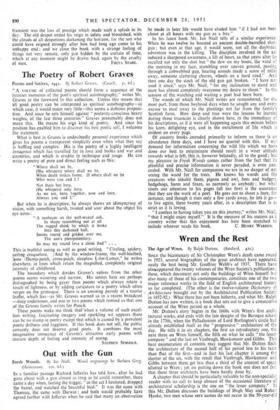The Poetry of Robert Graves Poems and Satires, 1951. By
Robert Graves. (Cassell. 7s. 6d.) "A VOLUME of collected poems should form a sequence of the intenser moments of the poet's spiritual autobiography," writes Mr. Graves in the foreword to this collection. Unless this means that all good poetry can be interpreted as spiritual autobiography—in which case, it would mean very little—this seems a dubious proposi- tion. And since he sets himself against posterity-conscious heavy weights, Of the last three centuries " Graves presumably does not mean this. He means his ovin kind of poetry. And since his position has enabled him to discover his best poetic self, I welcome the statement.
What is best in Graves is undoubtedly personal experience which gives his poems a transparent simplicity even when what they say is baffling and complex. His is the poetry of a highly intelligent innocence which has travelled far in love and boOks and war and countries, and which is erudite in technique and usage. He can write a poetry of pure and direct feeling such as this:
"Where shall we be, (She whispers) where shall we be,
When death strikes home. 0 where shalt we be Who were you and I?
Not there but here, (He whispers) only here, As we are, here, together, now and here.
Always you and I."
But when he is descriptive, he always shows an idiosyncrasy of vision, with something harsh, twisted and sour about the object his eye notes:
"A sunbeam on the well-waxed oak, In shape resembling not at all The ragged chink by which it broke Into this darkened hall, Swims round and golden over me, The sun's plenipotentiary.
So may my round love a chink find" . . .
This is truthful seeing as well as good writing. "Circling, spidery, ceiling craquelure. /And by the window-frame, the well-loathed, ;sine /Damp-patch, cross-patch, sleepless L-for-Lemur," he writes elsewhere, in lines which retain the magnified, completely original intensity of childhood.
The boundary which divides Graves's satires from the other poems seems wavering and narrow. His satires here are perhaps distinguished by being gayer than poems which always retain a touch of lightness; or by adding caricature to a poetry which often verges on the grotesque. There is an amusing parody of a tourist leaflet, which has—as Mr. Graves warned us in a recent broadcast —deep undertones, and one or two poems which remind us that one of the Graves family writes for Punch.
These poems make me think tharwhen a volume of such excel- lent writing, fascinating imagery and sparkling wit appears there can be no slump in poetry except that which is caused by a prevalent poetic dullness and fogginess. If this book does not sell, the public certainly does not deserve good poets. It combines the most imaginative innocence of Graves's attractive early poems with mature depth of feeling and intensity of seeing.
STEPHEN SPEINDER.






























 Previous page
Previous page